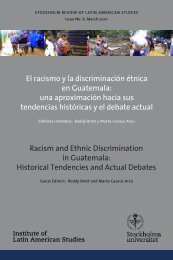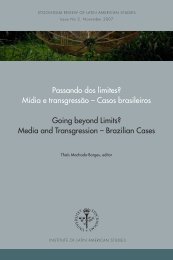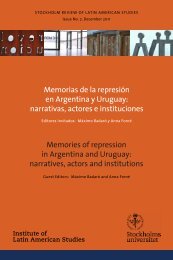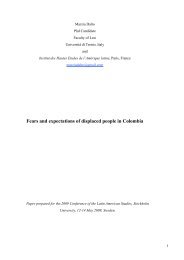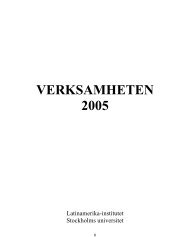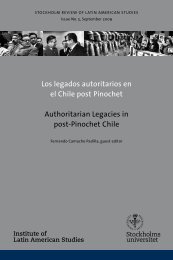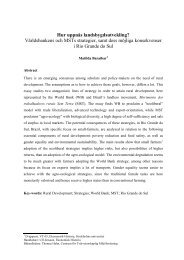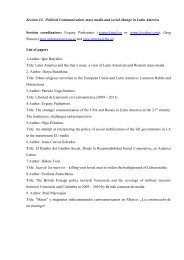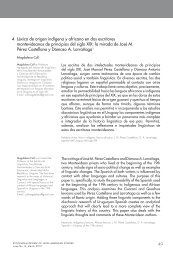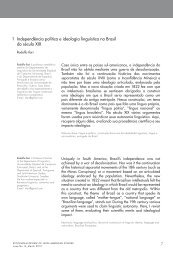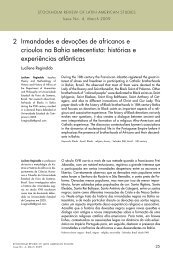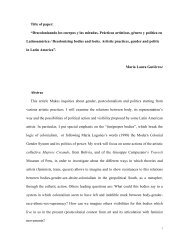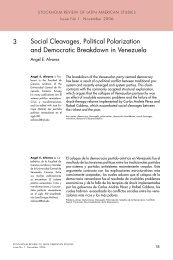Venezuelan Politics and Society in Times of Chavismo PolÃtica y ...
Venezuelan Politics and Society in Times of Chavismo PolÃtica y ...
Venezuelan Politics and Society in Times of Chavismo PolÃtica y ...
Create successful ePaper yourself
Turn your PDF publications into a flip-book with our unique Google optimized e-Paper software.
Tercermundismo <strong>and</strong> <strong>Chavismo</strong><br />
Daniel Hell<strong>in</strong>ger<br />
it is <strong>in</strong>corporat<strong>in</strong>g <strong>in</strong>to its circuits. It is customary<br />
for opponents to blame Chávez for the exodus <strong>of</strong><br />
150,000 <strong>Venezuelan</strong>s, but the underly<strong>in</strong>g cause<br />
<strong>of</strong> this reversal is runs deeper <strong>in</strong> the <strong>in</strong>ternational<br />
economy.<br />
The power <strong>and</strong> appeal <strong>of</strong> the Chávez message resides<br />
<strong>in</strong> his ability to articulate the deep resentment<br />
felt by the people. Few <strong>Venezuelan</strong>s are versed <strong>in</strong><br />
the history <strong>of</strong> yellow liberalism, the Federalist Wars,<br />
or the writ<strong>in</strong>gs <strong>of</strong> Zamora, Simón Rodríguez, <strong>and</strong><br />
Bolívar, but much <strong>of</strong> state culture (monuments <strong>and</strong><br />
the national anthem, for example) celebrates the historical<br />
myth associat<strong>in</strong>g <strong>Venezuelan</strong> national identity<br />
with a popular, egalitarian struggle for freedom<br />
aga<strong>in</strong>st a perfidious oligarchy. In this conception <strong>of</strong><br />
the nation, its “people” refers not to the bourgeois<br />
mean<strong>in</strong>g <strong>of</strong> “people” as a civil society composed <strong>of</strong><br />
legal equals, shar<strong>in</strong>g a common national identity,<br />
<strong>in</strong>tegrated <strong>in</strong>to market society <strong>and</strong> modern culture.<br />
“People” refers to a majority <strong>of</strong> <strong>Venezuelan</strong>s who<br />
live <strong>in</strong> that “other” society at the marg<strong>in</strong>s <strong>of</strong> civil<br />
society as it is known to the wealthy, the middle<br />
class, <strong>and</strong> parts <strong>of</strong> the work<strong>in</strong>g class. The project <strong>of</strong><br />
Betancourt was to <strong>in</strong>tegrate poor <strong>Venezuelan</strong>s <strong>in</strong>to<br />
modern national culture, predom<strong>in</strong>antly a Western,<br />
cosmopolitan, urban culture.<br />
Chávez draws upon Simón Rodríguez for a vision<br />
<strong>of</strong> democracy <strong>in</strong> more radical, Roussian terms,<br />
one that envisions a strong democratic state work<strong>in</strong>g<br />
actively to transform society to lay the basis<br />
for republican rule. The opposition <strong>of</strong>fers a more<br />
Lockean vision <strong>of</strong> polyarchy, characterized by<br />
checks <strong>and</strong> balances <strong>and</strong> consistent with the liberal,<br />
Wash<strong>in</strong>gton consensus (See Rob<strong>in</strong>son, 1996). Both<br />
visions draw upon a plan to modernize Venezuela’s<br />
political culture that will be difficult to achieve<br />
given the cultural <strong>and</strong> economic chasm between the<br />
social classes.<br />
The model <strong>of</strong> political modernization bequeathed<br />
to political science by the French Revolution <strong>and</strong><br />
Enlightenment, suggests that Lat<strong>in</strong> America will<br />
only progress once its traditional, personalist culture<br />
is replaced by a civic culture populated with<br />
rational, educated citizens capable <strong>of</strong> compet<strong>in</strong>g <strong>in</strong><br />
both the economic <strong>and</strong> political marketplace. Consistent<br />
with the pr<strong>in</strong>ciples <strong>of</strong> democracy as polyarchy,<br />
citizens are to articulate their <strong>in</strong>terests through<br />
freely formed organizations <strong>in</strong> civic society. Secular<br />
modernists like Betancourt, Rómulo Gallegos, Luis<br />
Beltran Figueroa, <strong>and</strong> others sought to tame la barbarie<br />
<strong>and</strong>, aided by oil rents, build a modern, Western<br />
democratic society, but the system they created<br />
never fully transcended the cultural <strong>and</strong> class divide<br />
between this liberal ideal <strong>and</strong> a population oriented<br />
not so much to traditional so much as “solidaristic”<br />
relations.<br />
The tendency toward caudillism is not restricted<br />
to el soberano. In a context <strong>of</strong> <strong>in</strong>stitutional void<br />
<strong>and</strong> <strong>in</strong>stability, middle class <strong>and</strong> bus<strong>in</strong>ess communities<br />
were <strong>in</strong> search <strong>of</strong> a c<strong>and</strong>idate with a strong<br />
personality, one who could fill the void left by the<br />
collapse <strong>of</strong> the parties. In mid 1997, Consultores 21<br />
asked a cross section <strong>of</strong> the population what model<br />
<strong>of</strong> president they preferred – Fidel Castro, Alberto<br />
Fujimori, another figure, or nobody (See Table 1).<br />
Although Castro was most popular among the most<br />
Table 1<br />
Preferred Model <strong>of</strong> President by Social Class<br />
Total<br />
Lower<br />
popular<br />
Popular<br />
Middle<br />
Popular<br />
Middle<br />
Middle<br />
Alberto Fujimori 43 10 32 53 49 50<br />
None 18 27 23 14 15 27<br />
Fidel Castro 16 25 17 13 16 4<br />
Others 18 19 19 16 18 15<br />
Middle-<br />
Upper<br />
Source: Percepción 21, vol 2, no. 2 (Caracas: Consultores 21, June 1997), p. 6. (Percentages do not add to 100 percent <strong>in</strong> the orig<strong>in</strong>al)<br />
(www.consultores21.com)<br />
Stockholm REVIEW OF Lat<strong>in</strong> American Studies<br />
Issue No 1. November 2006<br />
14



